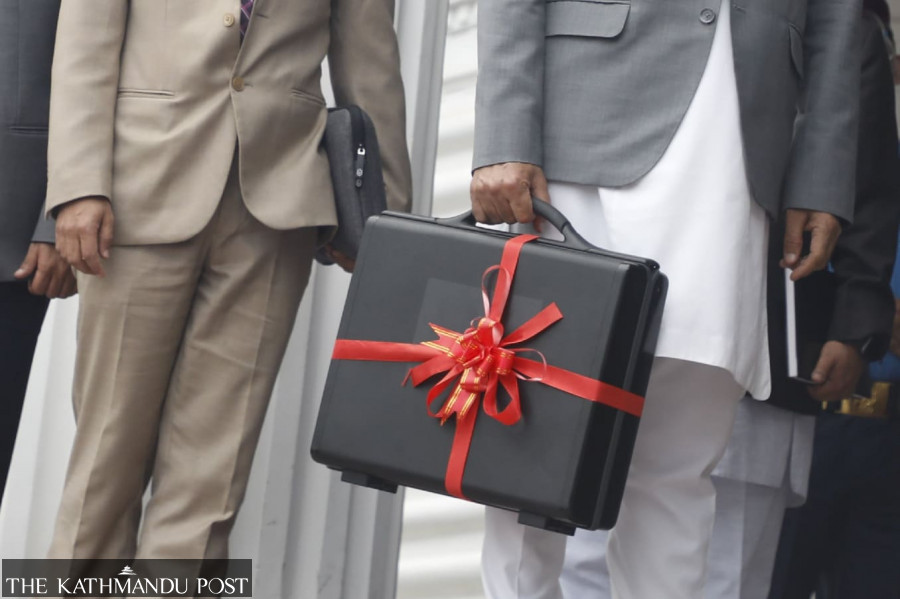National
After court’s observations, questions arise over fate of ordinance budget
The court called the introduction of the budget through an ordinance a week after House dissolution fraudulent. Legal experts say Deuba government can bring a new one.
Prithvi Man Shrestha
The Supreme Court’s observation in Monday’s verdict that the introduction of the budget for the next fiscal year 2021-22 by the outgoing Prime Minister KP Sharma Oli-led government as inappropriate and against the representative governance system, has raised questions about whether the new government should implement the budget.
The court’s verdict on Monday that reinstated the House of Representatives has also commented on the outgoing government’s move to introduce a full budget through an ordinance despite being a ‘caretaker’ government.
“It is not appropriate to dissolve the House of Representatives and give estimates of income and expenditure a legal form just a week ahead of the date of budget presentation and to introduce policies and annual programmes of long-term importance by a caretaker government instead of introducing expenditure arrangements for just compulsory liabilities of the government,” the court observed. “If such non-parliamentary practices are continued, they lead to the tendency of avoiding Parliament, devaluing constitutional provisions and exercising discretionary powers.”
Legal experts say it is up to the new government whether to continue with the current budget for the next fiscal year or introduce a new one.
“As the court didn’t issue any order on scrapping the budget despite questioning the intent of budget presentation through an ordinance after dissolving the House, it is up to the new government whether to introduce a new budget,” said Gandhi Pandit, a corporate lawyer. “If the House of Representatives fails to pass the ordinance under which the budget was introduced, introducing a new budget will be imperative.”
As per constitutional provisions, an ordinance must be presented in the House during the first meeting of its new session and passed within 60 days of its presentation. Otherwise, it gets annulled.
The court also said that the dissolution of the House of Representatives just a week ahead of the constitutionally-arranged budget presentation date can also be explained as fraud on implementation of Article 119 (3) of the constitution which mentions that the annual budget must be presented on Jestha 15 every year, which fell on May 29 this year.
“If legal provision is made to introduce a budget through an ordinance, there will be no meaning of representative governance system. Nepal’s current constitution does not allow a move towards such authoritarianism,” the court said.
Despite the censure, the court has not termed the outgoing government's move of introducing a budget through an ordinance as unconstitutional, said Bipin Adhikari, former dean of the Kathmandu University School of Law.
“The court has only said that by dissolving the lower house, the government undermined the parliamentary process on budget presentation,” he told the Post. “But the verdict has paved the way for introducing the new budget by scrapping this one. It is up to the new government whether to continue this one or introduce a new one.”
There is a constitutional provision that the government can bring a supplementary budget by continuing the budget introduced by the outgoing government, he said.
As per Article 121 of the constitution, the government has power to introduce a supplementary budget.
“The finance minister shall, in any financial year, present supplementary estimates before the House of Representatives, if it is found that the sum authorised to be spent for a particular service by the Appropriation Act for the current fiscal year is insufficient, or that a need has arisen for expenditure upon new services not provided for by the Appropriation Act for that year, or the expenditures made during that fiscal year are in excess of the amount authorised by the Appropriation Act,” reads Article 121 (1).
Even though then opposition parties and experts had been calling for introduction of a temporary budget for expenditure of compulsory liabilities of the government, the Oli government had rejected such calls and introduced the full budget through ordinance on May 29.
The outgoing finance minister Bishnu Poudel presented a budget of Rs Rs1.64 trillion for the fiscal year 2021-22, which begins July 16. The government has allocated Rs678.61 billion for recurrent expenditure, Rs374.26 billion for capital expenditure, Rs207.97 billion for financing and Rs386.71 billion for fiscal transfer.
As per the budget, Rs1024.9 billion will be raised from revenue, Rs309.29 billion from external debt, Rs250 billion from internal debt and Rs63.37 billion from foreign grants.
If the incoming Finance Minister Janardan Sharma does introduce a supplementary budget, he will not be the first to do so.
In 2008, the Nepali Congress-led government had presented a temporary budget authorising the government to spend just one-third of the total budget as per the provision of the Interim Constitution, as a new government had not been formed after the Constituent Assembly elections.
After he became finance minister in the Pushpa Kamal Dahal-led government, Baburam Bhattarai later introduced a full budget for the fiscal year 2008-09.
The court’s observation is significant in that it has warned against introducing a budget through ordinance in the future.
“It is a clear guideline for future governments against introducing a budget by avoiding parliament,” said Adhikari.
Nepali Congress leader Ram Sharan Mahat, who has served as the country’s finance minister multiple times, says a full budget should be presented when the parliamentary session begins and a temporary type of budget before the new fiscal year begins to cover the compulsory liabilities of the government such as salary, pension and payment of domestic and foreign loans. However, there is no constitutional provision on a temporary budget.
As per the Supreme Court’s order on Monday the new session of the House has to begin by July 18.
“A new full budget should be introduced at the parliament after the parliamentary session begins,” Mahat said. “After the Supreme Court pointed out the move of introducing a full budget by avoiding Parliament as a fraudulent activity, the budget introduced by the outgoing government cannot be implemented.”




 15.12°C Kathmandu
15.12°C Kathmandu













